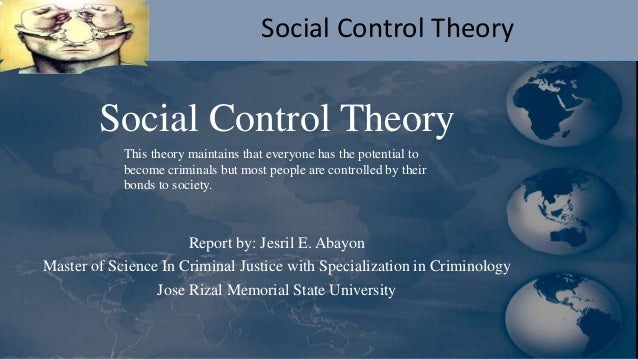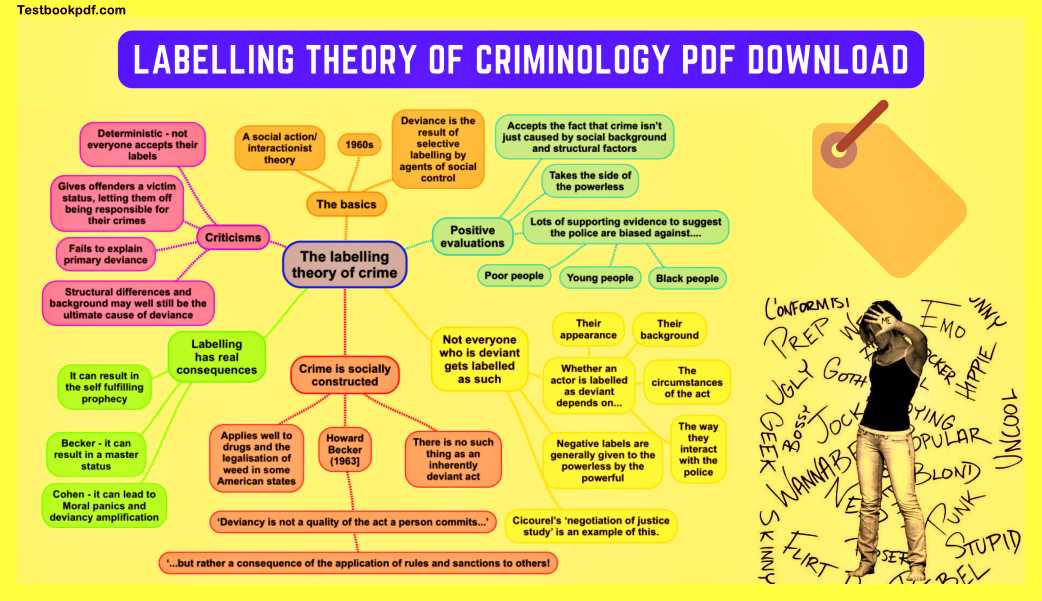Have you ever wondered what keeps people from breaking the law? It’s not always a fear of punishment, and it doesn’t always come down to innate moral compasses. Often, the answer lies in the invisible forces that shape our behavior: social control. Think about it: why don’t you steal a car, even though you know you could get away with it? Perhaps it’s because you value your reputation, or because you fear the consequences for your family. These are all examples of social control at work. In this article, we’ll delve deep into the fascinating world of social control theory, revealing how it explains criminal behavior and why understanding this theory is crucial for building safer, more just societies.

Image: www.slideshare.net
Social control theory, within the field of criminology, offers a compelling framework for understanding why individuals choose to conform to societal norms and laws. In contrast to theories that focus on the reasons why people commit crimes, social control theory examines the factors that prevent people from engaging in deviant behavior. It explores the bonds that bind individuals to society and the social, psychological, and structural influences that deter them from breaking the rules. This theory transcends the realm of academic inquiry, offering valuable insights into human behavior that can be used to promote positive social change.
The Roots of Social Control Theory: A Journey Through Time
Social control theory, as we know it today, has its roots in the pioneering work of the sociologist, Émile Durkheim. In his groundbreaking book, “The Division of Labor in Society,” Durkheim introduced the concept of “collective conscience”—the shared values, beliefs, and moral norms that bind members of a society together. Durkheim argued that crime and deviance arise when social bonds weaken, leading to a breakdown of collective conscience.
Following Durkheim’s work, other prominent sociologists, such as Robert Merton and Talcott Parsons, further developed the idea of social control. Merton’s “strain theory” proposed that deviance occurs when individuals experience a gap between their aspirations and the means available to achieve them. Parsons, on the other hand, emphasized the importance of social institutions in shaping individual behavior, suggesting that institutions like the family, education, and the legal system play a vital role in fostering social control.
Unpacking Social Control Theory: Key Concepts and Definitions
Social control theory rests on the fundamental premise that individuals are inherently capable of deviance, but they are deterred by the social bonds that connect them to society. Think of it like a metaphorical rope tethering us to the good side, keeping us from crossing the line into deviant territory. Now, let’s break down some of the key concepts that form the foundation of this theory:
-
Attachment: This refers to the emotional connections individuals have with others, like family, friends, and significant others. Strong attachments to conventional society make people less likely to engage in criminal behavior, as they don’t want to disappoint or lose the love and support of those around them.
-
Commitment: This concept emphasizes the investment individuals make in conventional activities, such as education, career, and financial stability. People who are deeply invested in these pursuits are less likely to risk jeopardizing their hard work and achievements by engaging in illegal actions.
-
Involvement: This refers to the amount of time and energy individuals dedicate to conventional activities, leaving little room for deviant behavior. For example, a person heavily involved in sports, community events, or a fulfilling job simply doesn’t have the time and mental space to entertain criminal thoughts.
-
Belief: This concept refers to the degree to which individuals accept the values and norms of society. Those who strongly believe in the moral principles of their culture, are more likely to conform to social expectations and avoid actions deemed inappropriate or illegal.
The Power of Social Control: Real-World Applications
Social control theory offers valuable insights into criminal behavior, and its principles have far-reaching implications for intervention strategies and crime prevention efforts. Here are some examples of how this theory is applied in real-world scenarios:
-
Community Policing: This strategy emphasizes building strong relationships between law enforcement officers and community members. By fostering a sense of attachment and trust, community policing aims to enhance social control and reduce crime.
-
Youth Programs: Programs that provide young people with opportunities to develop their social skills, build positive relationships, and engage in meaningful activities, help to strengthen their bonds to society and reduce their risk of delinquency.
-
Rehabilitation: Correctional programs that focus on building social skills, fostering employment opportunities, and reintegrating individuals into society, aim to help offenders re-establish social bonds and prevent them from recidivism.
However, it’s important to remember that social control theory isn’t a panacea that can address all forms of crime. There are complex factors, like poverty, discrimination, and systemic inequalities, that contribute to criminal behavior, and more holistic approaches are needed to address these underlying issues.

Image: testbookpdf.com
Social Control Theory: Challenges and Criticisms
While social control theory provides a valuable framework for understanding criminal behavior, it’s not without its limitations and criticisms. Some argue that the theory overlooks the role of individual agency and choice in shaping behavior. Others point out that social control measures themselves can be discriminatory and oppressive, leading to unfair outcomes for marginalized communities. It’s also important to recognize that the theory’s focus on social bonds and conformity might not fully capture the nuances of criminal behavior, particularly in contexts where social control is weak or absent.
Expert Insights on Social Control Theory
Dr. John Braithwaite, a leading criminologist and scholar of restorative justice, offers a nuanced perspective on social control theory. Dr. Braithwaite argues that effective social control should be based on principles of reintegration rather than punishment. He believes that restorative justice practices, which focus on repairing harm and rebuilding relationships, can play a crucial role in strengthening social bonds and preventing crime.
Empowering Actions: Strengthening Social Bonds for a Better Future
Social control theory emphasizes the power of social bonds in shaping behavior. By strengthening these bonds, we can create a safer and more just society for all. Here are some actionable steps we can take to empower ourselves and our communities:
-
Invest in community building: Participate in community events, volunteer your time, and create opportunities for connection and collaboration.
-
Strengthen family bonds: Make an effort to stay connected with loved ones, offer support, and nurture lasting relationships.
-
Promote positive social change: Engage in activities that promote social justice, address systemic inequalities, and create a more equitable society.
By recognizing the crucial role of social control in shaping human behavior, we can actively contribute to building a safer, more just, and more compassionate society. It’s a journey that requires ongoing reflection, active participation, and a commitment to empowering ourselves and others.
Social Control Theory Definition Criminology
Conclusion: Embrace the Power of Connection
Social control theory sheds light on the profound power of social bonds in shaping human behavior. It reminds us that we are all interconnected and that our choices have ramifications that extend beyond ourselves. By understanding the principles of social control, we can empower ourselves, our communities, and future generations to create a world where everyone feels safe, connected, and valued.
Join the conversation! Share your thoughts on social control theory. Have you witnessed its impact in your own life or community? What steps can we take to strengthen social bonds and create a more just society? Let’s work together to build a world where everyone has the opportunity to thrive.






